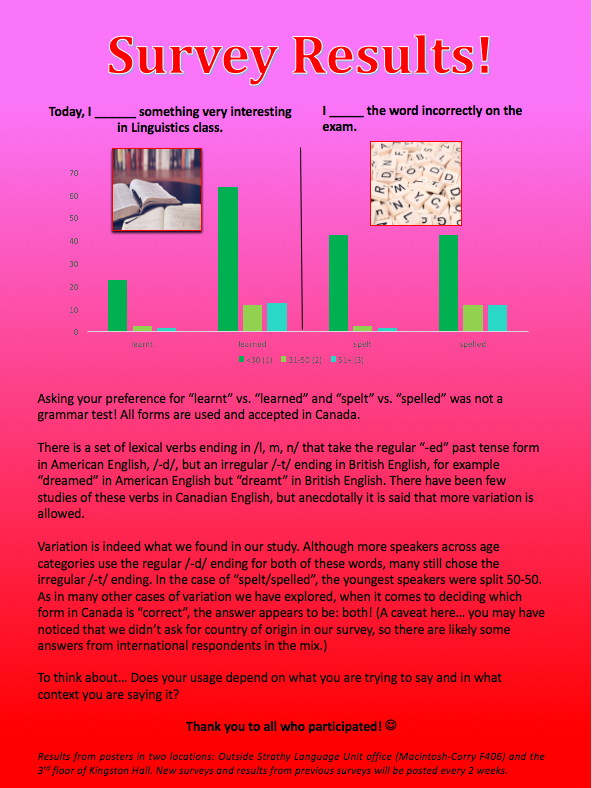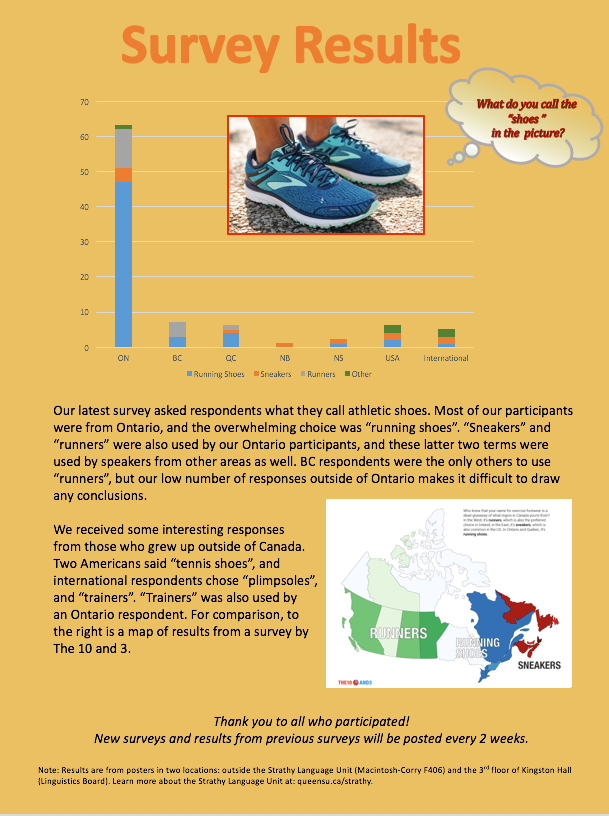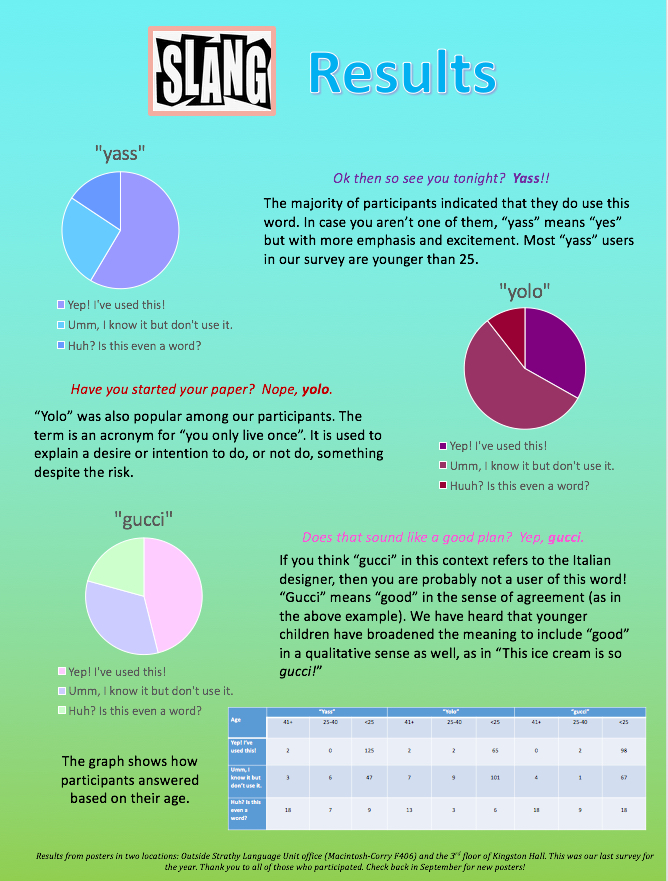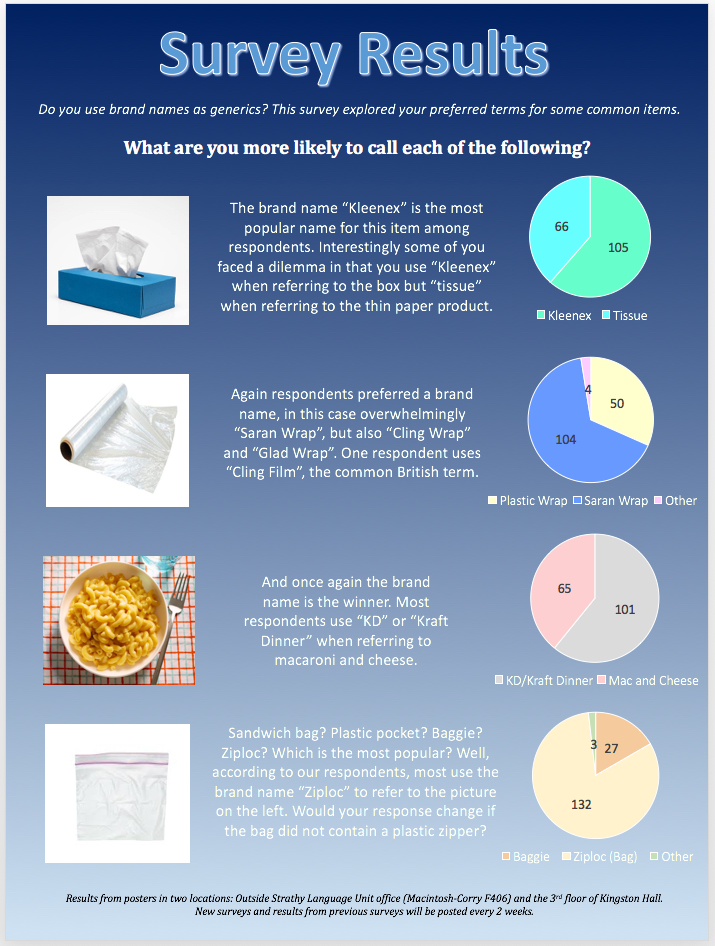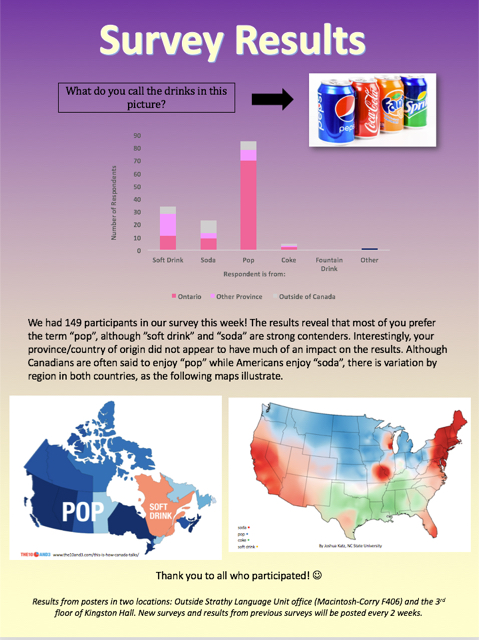News about the Strathy Language Unit and Canadian English studies
[Please note that this page is an archive of blog posts from 2018. Some of the links to articles are no longer active.]
Words of the Year
Date: December 19, 2018 | Category: In the Media
What words marked your year? Here are the choices of a few dictionaries, with explanations in the links. Stay tuned for more as the year comes to a close!
- toxic - Oxford Dictionaries
- justice - Merriam-Webster
- misinformation - Dictionary.com
Time for Change in Hockey
Date: December 5, 2018 | Category: In the Media
Advocates for little people spearhead efforts to have the term 'midget' dropped from hockey classifications.
- The clock has run out on 'midget hockey', say Little People advocates in Alberta (The Star, Dec .9, 2018)
- 'Midget' designation in sports leagues 'something that just needs to change' advocates say (CBC, Nov. 27, 2018)
Wriggly
Date: December 1, 2018 | Category: In the Media
A new study investigates the words that make us laugh.
- Canadian study finds funniest words in English language (CTV News, Nov. 28)
'Windex' or 'Window Cleaner'?
Date: November 26, 2018 | Category: News
Do you use brand names as generics?
Click on image to open pdf.
Up North, We Eat 'Pickerel'
Date: November 19, 2018 | Category: In the Media
'Walleye' vs. 'pickerel': two fish? Or one fish, two names?
- Frank's tackle box: Breaking down a myth (Sudbury Star, Nov. 10, 2018)
When Pigs Have Wings
Date: November 10, 2018 | Category: In the Media
Writer Mark Abley takes us on a journey through some common English idioms.
- One way to keep language real: reconfigure our figures of speech (Globe and Mail, Nov. 2018)
Learned or learnt?
Date: October 29, 2018 | Category: News
Thanks to our "bulletin board" researcher Olena for another interesting survey! What do you say?
Click image to open pdf.
'Lit' is out, 'yeet' is in
Date: October 28, 2018 | Category: In the Media
How's your millennial slang?
- Avo is bougie, lit is basic and other millennial slang, decoded (Toronto Star, Oct 26, 2018)
The Language of Cannabis
Date: October 16, 2018 | Category: In the Media
Marijuana becomes legal tomorrow throughout Canada. Do you need to brush up on your pot lingo?
- Cannabis: From A to Z (Winnipeg Free Press, Oct. 1, 2018)
Don Your Runners!
Date: October 15, 2018 | Category: News
The results of our latest bulletin board survey are in! What do you wear?
Click image to open pdf.
TRY-plex or TRIP-lex?
Date: October 12, 2018 | Category: In the Media
It can be refreshing when municipal disagreements morph into discussions about language, as they did last week in Ottawa. Issues around the building regulations for triplexes turned into a debate over the pronunciation of the word.
- How do you pronounce 'triplex'? (CBC, October 4, 2018)
Facepalm
Date: October 1, 2018 | Category: In the Media
You may have been inspired to cover your face with your hand in exasperation during past games of Scrabble, but only now can you spell out your feelings...
- Scrabble adds 300 new words, including 'OK' and 'ew, " to its dictionary (Toronto Star, Sept. 24, 2018)
Chicken Talk
Date: September 24, 2018 | Category: In the Media
A summer with backyard chickens has inspired one writer to reflect on how chickens have contributed to the English language...
- How do we love chickens? Let us count the words (Toronto Star, Sept. 15, 2018)
Summer Media Stories
Date: September 10, 2018 | Category: In the Media
It was a light summer as far as Canadian English media stories were concerned, but here are a couple you may have missed.
- The commas that cost companies millions (BBC, July 23, 2018)
- What's a bunnyhug: The most-searched Canadian words, by province (CTV News, June 30, 2018)
The Blog is Back!
Date: September 4, 2018 | Category: In the Media
While we were away, Canadian actor Will Arnett taught the world some Canadian English slang:
More summer media stories soon to follow!
Happy Summer!
Date: July 1, 2018 | Category: News
The blog is taking its annual July-August hiatus. Meanwhile, the unit is open! Please get in touch with any questions, comments or suggestions.
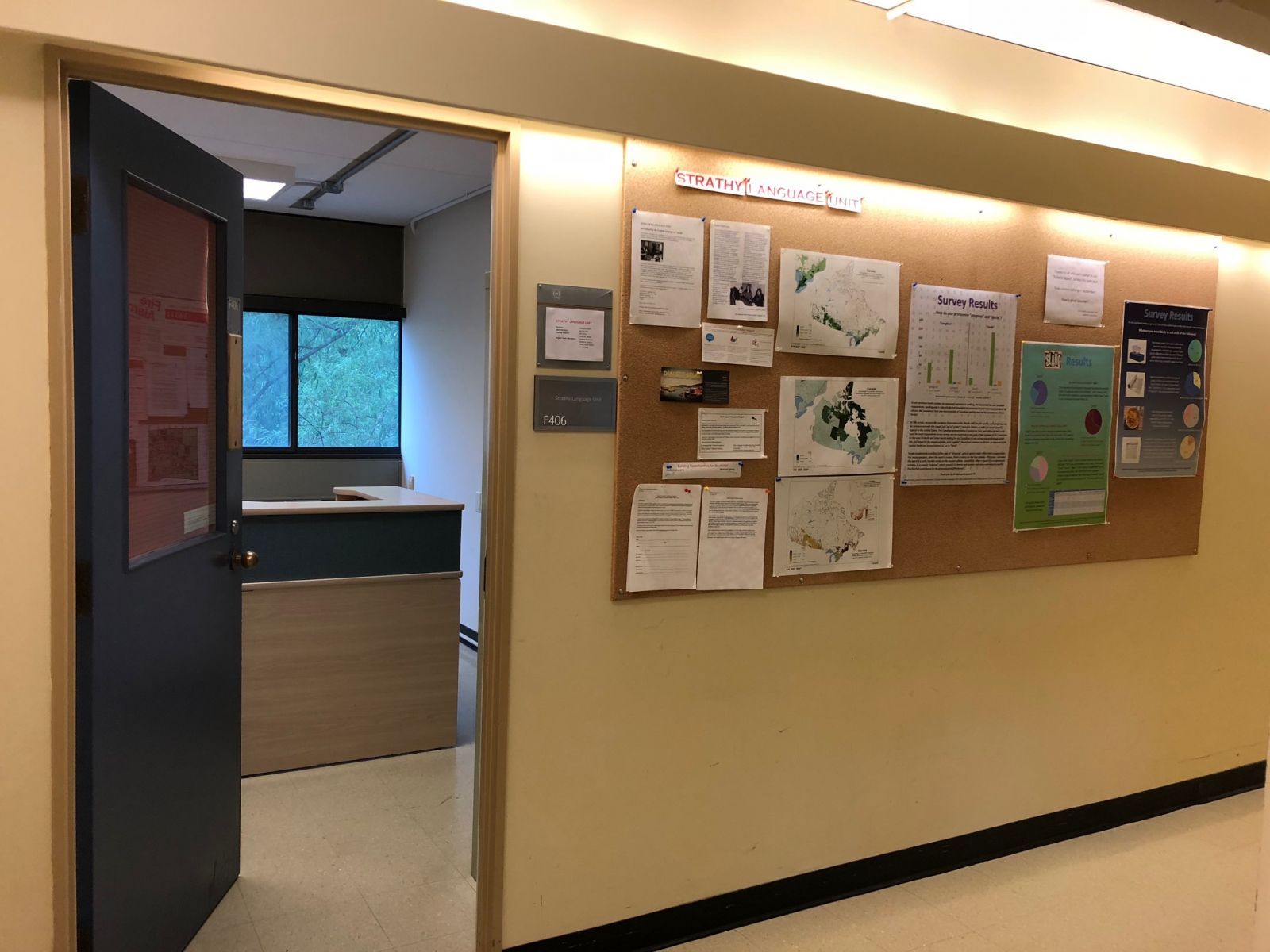
Quebec English
Date: June 29, 2018 | Category: In the Media
If you use the guichet at the dep, you are a proud speaker of Quebec's unique English.
- How English and French co-exist in Montreal to inform the richness of each other's linguistic identities (National Post, June 25, 2018)
Regional Dialects Remain Strong
Date: June 27, 2018 | Category: In the Media
"While previous generations of Canadians often made efforts to downplay their regional dialects, younger cohorts are embracing them" ...
- Despite cultural globalization, Canadian regional dialects are stronger than ever (National Post, June 25, 2018)
Do You Play "Soccer-Baseball"?
Date: June 26, 2018 | Category: In the Media
Where do your "Canadianisms" fall on the map?
Alumin(i)um
Date: June 11, 2018 | Category: In the Media
Steel tariffs are not the only issue in dispute in the trade war between Canada and the U.S. Is it "aluminum" or "aluminium"?
- Is the U.S. taxing 'aluminum' or 'aluminium'? Why there are two pronunciations for one metal (National Post, June 2, 2018)
Newfoundlanders
Date: May 15, 2018 | Category: In the Media
The use of the term "Newfie" in association with the travel food program Parts Unknown is generating controversy and prompting interesting discussions around language and identity:
- Newfoundlanders upset over use of offensive term in Anthony Bourdain's show promotion (Global News, May 10, 2018)
This Survey is So Gucci
Date: May 8, 2018 | Category: News
Our last bulletin board survey of the term asked participants about their use and knowledge of three slang words. Where do you fall in each pie chart?
Click on the image to open a pdf.
Um, Why Do We Hesitate?
Date: May 2, 2018 | Category: In the Media
A columnist for the Montreal Gazette ponders the research on how and when we "um", "uh" and "er"...
- Uh, what, um... uh, should I, uh, headline this column? (Montreal Gazette, March 31, 2018)
New Exhibits at the Canadian Language Museum
Date: April 30, 2018 | Category: News
The Canadian Language Museum will launch two new exhibits on May 1st! Messages from the Mosaic includes the premier of Two Row Wampum, a short documentary about maintaining Indigenous languages in Toronto. Legacies: Our Heritage Through Our Grandmother's Eyes is a photo exhibit featuring the stories of immigrant woman. Visit the museum website for more information.
Cross-Communication: Canadian Writers Reflect on Language and Culture
An Interview with Rawi Hage
Date: April 10, 2018 | Authors: Zara Diab and Shannon Steele
In this series for the Strathy Blog, we explore the theme of “language” in Canadian literature — in particular the implications of a space containing multiple languages and the movement from one language and culture to another — through a series of interviews with Canadian writers. We reached out to a variety of multilingual voices from different linguistic and cultural backgrounds who engage with language in their work. Our interest lies in how language forms and informs their texts. This week we feature the final interview in our series, a conversation with author Rawi Hage. Our previous interviews were with Ayelet Tsabari, Mary di Michele and Doretta Lau.
Rawi Hage is a Lebanese-Canadian writer based in Montreal. His award-winning novels include De Niro’s Game, Cockroach and Carnival. As an immigrant to Canada for whom English is a third language, Hage has an interesting perspective on our topic of language and culture, which he explores in his work and shares in our interview.
Can you tell us a bit about your language background? Do you use certain languages for certain contexts?
I grew up speaking Arabic, in particular a Lebanese dialect that was specific to a particular neighbourhood in Beirut. This is, of course, before the standardization of the various regional dialects by the mega burst of TV channels. At the time Lebanon’s multiple regional dialects were more apparent and accentuated. In her early years after her arrival to Beirut, my mother spoke a northern accent that was heavily influenced by the previously spoken Syriac language in the region (a dialect that has its roots in Aramaic). With time Arabic became the dominant spoken language of the region. My father was a first generation Beiruti and spoke with the current Beirut accent.
I studied in a Lebanese school. Arabic was taught as a language (i.e. grammar, reading, writing) as well as Arabic literature and Arab history but most of the other materials such as science, geography and French literature were taught to us in French. Our French textbooks were imported from France.
Click here to read the full interview.
Change and Variation in Canada 10
Date: April 9, 2018 | Category: News
The tenth annual Change and Variation in Canada (CVC) workshop will be held at the University of Manitoba on May 4-5. The program promises some great Canadian English talks and a special session on Canadian vowels.
From the conference website:
|
The Tenth Annual Change and Variation in Canada (CVC 10) Workshop will take place May 4-5, 2018 at the Université de Saint-Boniface campus in Winnipeg, organized by the University of Manitoba. This (French-English) bilingual workshop brings together researchers in a variationist framework working on Canadian language varieties and/or at Canadian institutions. Plenary speaker: Dr. Jennifer Nycz, Georgetown University This year there will be a special session on Canadian vowels. Submissions are welcome for this session, and there will be four invited talks specifically on this topic: Invited special session speakers: Dr. Rebecca Roeder, University of North Carolina, Charlotte Dr. Julia Swan, San Jose State University Dr. Vincent Arnaud, Université du Québec à Chicoutimi There will be two free methodological workshops for CVC participants. The first workshop will be on using R in data analysis, tailored to participants’ needs, and facilitated by Dr. Kevin Russell (University of Manitoba). The second will be on incorporating gesture and video in variationist research, facilitated by Dr. Terry Janzen and Dr. Erin Wilkinson (University of Manitoba). |
Cross-Communication: Canadian Writers Reflect on Language and Culture
An Interview with Doretta Lau
Date: April 3, 2018 | Authors: Zara Diab and Shannon Steele
In this series for the Strathy Blog, we explore the theme of “language” in Canadian literature — in particular the implications of a space containing multiple languages and the movement from one language and culture to another — through a series of interviews with Canadian writers. We reached out to a variety of multilingual voices from different linguistic and cultural backgrounds who engage with language in their work. Our interest lies in how language forms and informs their texts. Each week for four weeks, we will post a new author interview. This week we feature Doretta Lau. Our previous interviews were with Ayelet Tsabari and Mary di Michele.
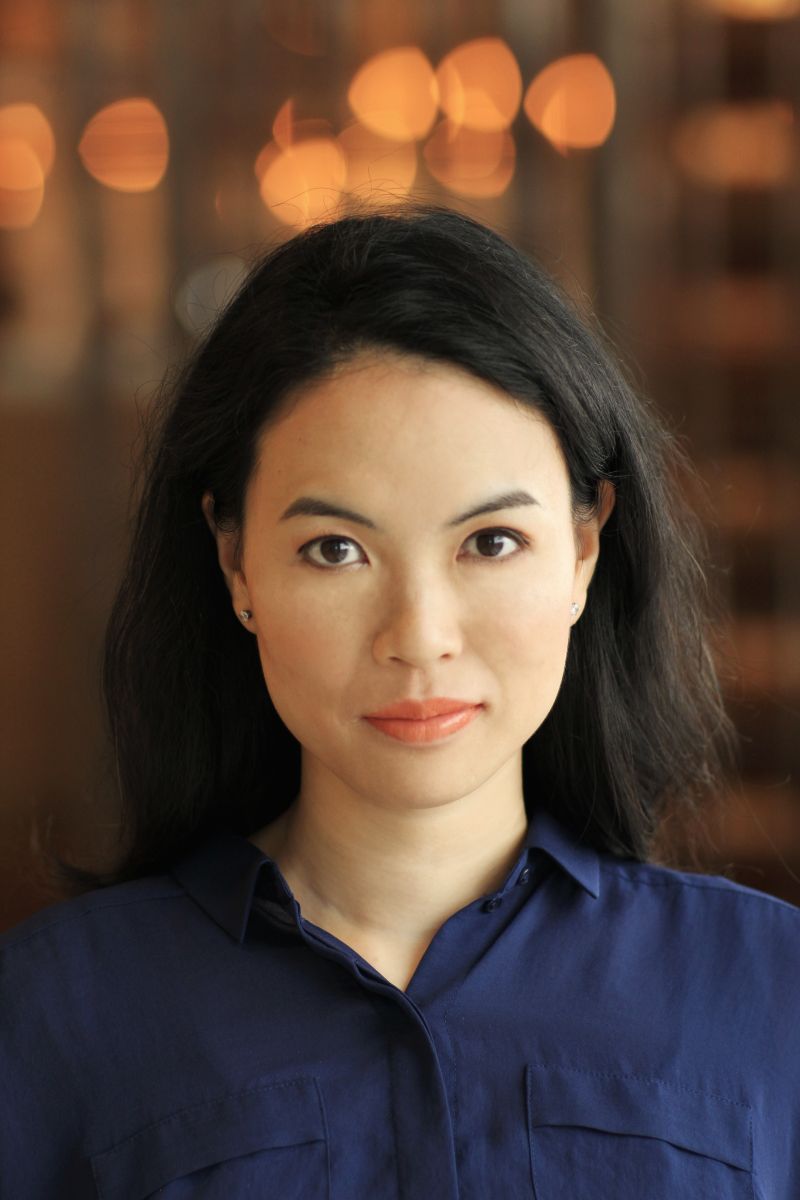 Doretta Lau is a second-generation Chinese-Canadian author, notable for her poetry and fiction, including the 2014 short story collection How Does a Single Blade of Grass Thank the Sun?. She was born in Vancouver to immigrant parents and now spends her time between Canada and Hong Kong. In the titular short story of her collection, Lau portrays Chinese-Canadian teens playing with slang and concepts of hybridity.
Doretta Lau is a second-generation Chinese-Canadian author, notable for her poetry and fiction, including the 2014 short story collection How Does a Single Blade of Grass Thank the Sun?. She was born in Vancouver to immigrant parents and now spends her time between Canada and Hong Kong. In the titular short story of her collection, Lau portrays Chinese-Canadian teens playing with slang and concepts of hybridity.
Can you tell us a bit about your language background? Do you use certain languages for certain contexts?
My native language is English, but the first language I learned at home was Cantonese. I started learning how to read and write in English when I was three. I cannot write or read Chinese beyond a few simple words, even though I took classes for ten years. (I can read important things like menus.) While growing up I learned a bit of Mandarin, and took French in school until grade twelve. For work, I use English, and I speak Cantonese to my parents as well as when I am in Hong Kong.
Click here to read the full interview.
Canadian English: 2001 and Beyond
Date: April 2, 2018 | Category: In the Media
You likely recognize the voice of HAL in 2001: A Space Odyssey, but do you recognize it as Canadian? In this piece about HAL's voice in The New York Times, linguist Jack Chambers reflects on why a Canadian English voice may be the perfect choice for AI.
- The story of a voice: HAL in '2001' wasn't always so eerily calm (The New York Times, March 30, 2018)
Cross-Communication: Canadian Writers Reflect on Language and Culture
An Interview with Mary di Michele
Date: March 27, 2018 | Authors: Zara Diab and Shannon Steele
In this series for the Strathy Blog, we explore the theme of “language” in Canadian literature — in particular the implications of a space containing multiple languages and the movement from one language and culture to another — through a series of interviews with Canadian writers. We reached out to a variety of multilingual voices from different linguistic and cultural backgrounds who engage with language in their work. Our interest lies in how language forms and informs their texts. Each week for four weeks, we will post a new author interview. Our first interview was with Ayelet Tsabari. This week we feature Mary di Michele.
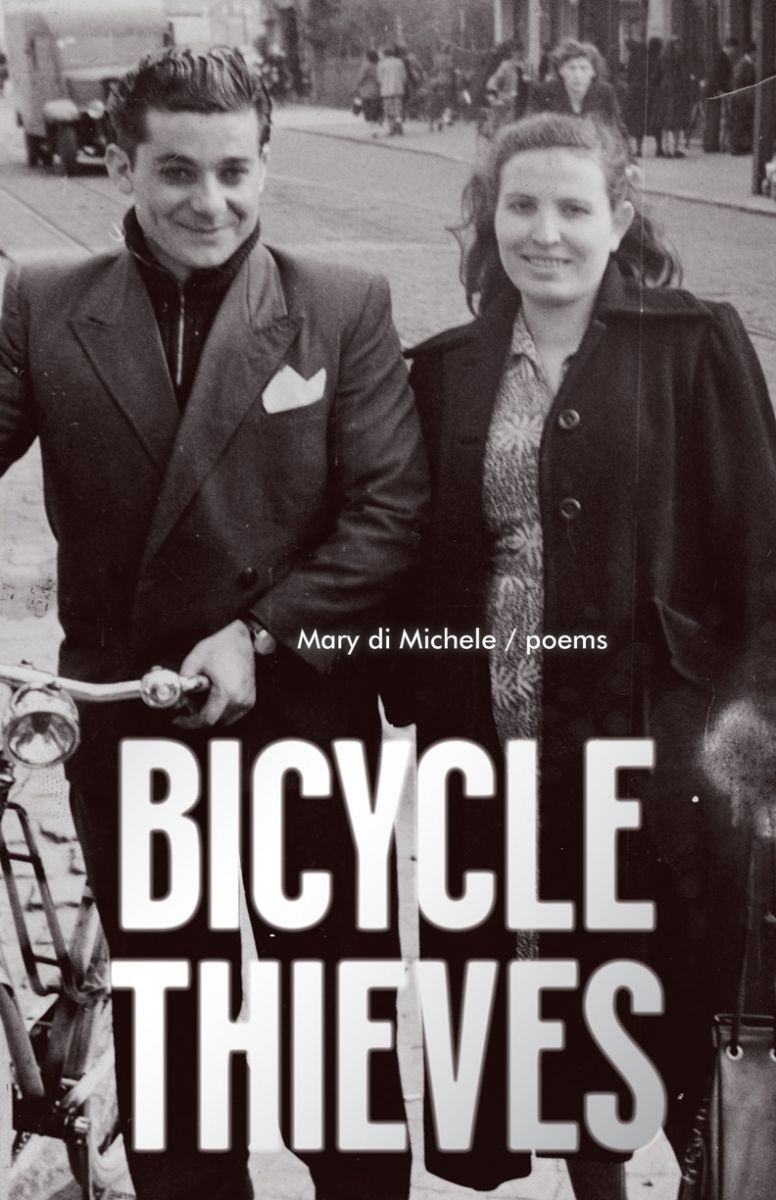
Mary di Michele is an Italian-Canadian author and poet living in Montreal. She is known for writing autobiographical pieces which deal with her upbringing in Italy and her move to Canada as a child. Her most recent collection, Bicycle Thieves, contemplates her Italian and Canadian identities: a work of translation and self. You can read her poem "The Bicycle Thief" here.
Can you tell us a bit about your language background? Do you use certain languages for certain contexts?
My first language was Italian; I was born in Italy, and lived in Europe until I was nearly six years old. I say Europe because during that time I spent a couple of years in Belgium where my brother was born. I lived in a Flemish-speaking city there and my mother tells me I spoke Flemish but I have no memory of this. I learned to speak English in Canada; we immigrated here in the mid-fifties of the last century. My mother never quite learned to speak English so Italian, more precisely, the Abruzzese dialect, was the language I spoke at home with her. But my father, who took night classes to learn and improve his English, spoke English with us. He said we had moved to this country (to Toronto) and should learn to speak the language well. In this he was very unlike the fathers of my Italian friends and relatives who insisted on speaking Italian in the home.
I work in an English language and literature department; I rarely speak Italian since my mother died. I keep my connection to Italian through my reading and translating of Italian poetry. I have been living in Quebec where French is the primary language since the fall of 1990. I had studied French literature in university and my reading skills are good. I understand the standard French of Radio Canada, but have trouble with street French, and I am not a fluent speaker. My level of French is about the same as Italian; I can read much better than I can speak the language.
Click here to read the full interview.
New Survey Results
Date: March 26, 2018 | Category: News
How do you pronounce progress and docile? See how your vowels compare to those of the participants in our latest bulletin board survey!
Click on the image to open a pdf.
Cross-Communication: Canadian Writers Reflect on Language and Culture
An Interview with Ayelet Tsabari
Date: March 20, 2018 | Authors: Zara Diab and Shannon Steele
In this new series for the Strathy Blog, we explore the theme of “language” in Canadian literature — in particular the implications of a space containing multiple languages and the movement from one language and culture to another — through a series of interviews with Canadian writers. We reached out to a variety of multilingual voices from different linguistic and cultural backgrounds who engage with language in their work. Our interest lies in how language forms and informs their texts. Each week for the next four weeks, we will post a new author interview. We begin with Ayelet Tsabari.
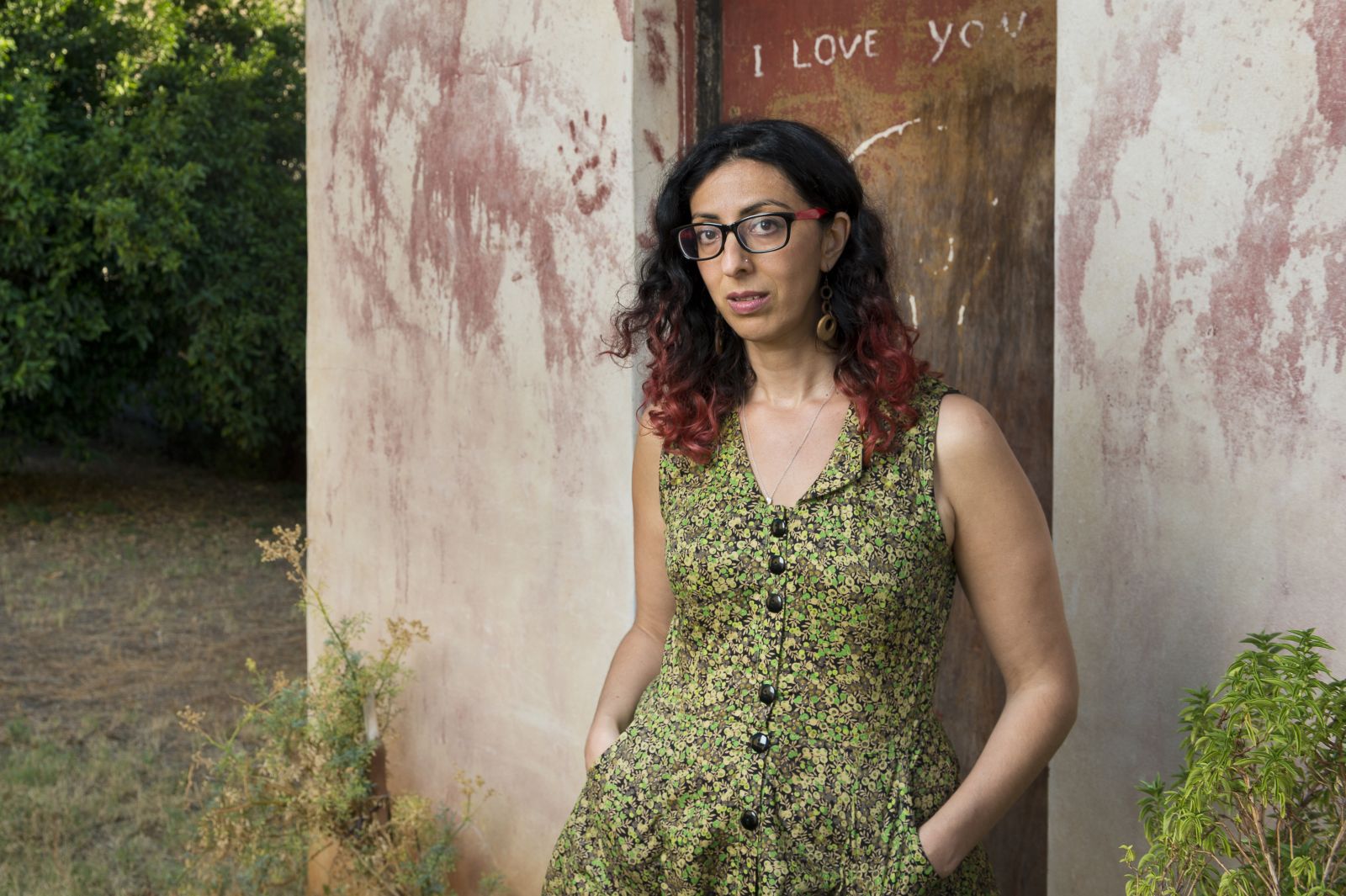 Ayelet Tsabari is an Israeli-Canadian author of essays, short stories and poetry, including the acclaimed 2015 short story collection The Best Place on Earth. Her position on multilingualism is unique because she was an author in Israel, working in Hebrew, before shifting to write in English after her move to Canada. Her aforementioned collection is set in both Israel and Canada and discusses many different themes, such as immigration and finding one’s home.
Ayelet Tsabari is an Israeli-Canadian author of essays, short stories and poetry, including the acclaimed 2015 short story collection The Best Place on Earth. Her position on multilingualism is unique because she was an author in Israel, working in Hebrew, before shifting to write in English after her move to Canada. Her aforementioned collection is set in both Israel and Canada and discusses many different themes, such as immigration and finding one’s home.
Can you tell us a bit about your language background? Do you use certain languages for certain contexts?
Hebrew is my mother tongue. My grandparents’ mother tongue was Arabic, more specifically Judeo-Arabic in a Yemeni dialect, of which I only know a few dozen words that had snuck into our daily family life. I also learned Arabic (the Palestinian dialect) in school in Israel but unfortunately, I haven’t retained too much of it and possess very basic conversational skills. Still, Arabic has a special place in my heart. It’s the language of my ancestors, of our songs and poetry, and the language of the region in which I grew up. I really regret not putting more effort into learning it in school. I worked at a Lebanese restaurant in Vancouver for a few years, where I had the chance to use my poor Arabic occasionally, and during that time I took some Arabic lessons to refresh the language. I’ve been meaning to get back to it for years. I hope I will soon.
Click here to read the full interview.
I Love KD!
Date: March 6, 2018 | Category: In the Media
Do you use brand names to refer to generic items? See what our survey participants said...
Click image to open pdf.
Women Only
Date: March 6, 2018 | Category: In the Media
There are plenty of women in competitive sports, but no more room for ladies...
- It's time for every night to be women's night at the Olympics (Toronto Star, February 20, 2018)
Problem Punctuation
Date: March 5, 2018 | Category: In the Media
This time last year, the trouble was the lack of a comma, and now the presence of an apostrophe is making news...
- Delta fixes errant apostrophe on sign for Deas Island Regional Park (Vancouver Sun, February 20, 2018)
Lost in Translation?
Date: March 5, 2018 | Category: In the Media
The appropriateness of Prime Minister Justin Trudeau's use of the French term 'nono', as well as the word's translation into English, have sparked debate...
- A possible no-go: How do you translate 'nonos'? (The Montreal Gazette, February 1, 2018)
Enduring Love for the Canadian Oxford
Date: February 20, 2018 | Category: In the Media
The Canadian Oxford Dictionary turns twenty this year. For one journalist, an appreciation for the dictionary and editor Katherine Barber have grown stronger over time...
- Paul Sparkes: Barber was the chair (The Telegram, February 19, 2018) [no longer available]
Canadian English Vowel Study
Date: February 16, 2018 | Category: In the Media
If you are a monolingual English speaker living in or east of Manitoba, a research team at the University of Alberta needs your help! If you're not, you will still enjoy reading about their ongoing research on vowel quality...
- Researcher wants a word with you about regional language differences (Herald News, February 1, 2018) [no longer available]
Strathy Occasional Papers Now Online!
Date: February 13, 2018 | Category: News
We recently digitized several volumes of the series Strathy Occasional Papers on Canadian English and made them available online. You can access all of the volumes on our QSpace site.
The newly digitized volumes include:
- In Search of the Standard in Canadian English, edited by W.C. Lougheed, 1986
- The English Language as Used in Quebec, A Survey, by Tom McArthur, 1989
- The Ottawa Survey of Canadian English, by Howard Woods, 1999
- The Survey of Vancouver English: A Sociolinguistic Survey of Urban Canadian English, by R.J. Gregg, edited by M. Fee and J. McAlpine, 2004
We still have hard copies of these issues available as well. If you would like one, please contact us.
Would You Like A Soda?
Date: February 6, 2018 | Category: News
... Or would you prefer a pop or a soft drink? Here's what participants in our latest bulletin board survey said.
In All of Us Command
Date: February 5, 2018 (Updated February 8, 2018) | Category: In the Media
After years of discussion, and not without controversy, the Senate voted to change the lyrics of the national anthem from "in all thy sons command" to "in all of us command". Read more...
- 'O Canada' lyric change sparks debate, but the anthem was originally gender neutral (Global News, February 2, 2018)
- 'The right side of history': New gender neutral national anthem lyrics pass senate despite Conservative protest (National Post, January 31, 2018)
- Senate passes bill to make O Canada lyrics gender neutral (CBC News, January 31, 2018)
Update: The change became official February 7, 2018...
- Gender-neutral lyrics to O Canada become official (Globe and Mail, February 7, 2018)
A Newfoundland Treasury
Date: February 1, 2018 | Category: News
A Newfoundland Treasury of Terms for Ice and Snow - the latest exhibit of the Canadian Language Museum - opens tonight in Toronto! See the poster for details. If you can't make the opening, the exhibit will be on display at the Glendon Gallery through March.
Newfoundland Accent
Date: January 30, 2018 | Category: In the Media
As part of their series The Accent Effect, CBC explores the shifting stereotypes around the Newfoundland English accent.
- N.L. accent the outlier among English speakers across Canada (CBC News, January 28, 2018)
Dove or Dived? Dreamt or Dreamed?
Date: January 29, 2018 | Category: News
Our latest informal bulletin board survey reveals that participants "dove" and "dreamt". What about you? Click to enlarge the image.
Canadian Accents
Date: January 23, 2018 | Category: In the Media
Toronto is often celebrated as a "city of languages", but accent discrimination persists. "The Accent Effect", a new CBC series, tackles this issue in the first episode.
- In a city of accents, what's considered 'cute' versus 'foreign' reveals a hierarchy (CBC News, Jan. 22, 2018)
Merb'ys
Date: January 22, 2018 | Category: In the Media
Not familiar with the Newfoundland and Labrador Word of the Year? Check out this article for merb'ys' meaning and origins, along with some other interesting Word of the Year contenders!
- Sorry skeets and backhoes, Merb'ys is the N.L. Word of the Year (CBC News, Jan. 20, 2018)
Don't Go Changin'
Date: January 16, 2018 | Category: In the Media
The media's favorite topic when it comes to language – change – is especially evident around the turn of the year. Here are a few recent articles on new words, new meanings and even new punctuation usage.
- How the evolution of the English language went bigly (National Post, Jan. 6, 2018)
- 'Fake news' tops tongue-in-cheek list of words to banish in the new year (The Globe and Mail, Dec. 31, 2017)
- Punctuation with style in the digital age (The Globe and Mail, Dec. 15, 2017)
Language and Nostalgia in Newfoundland
Date: January 15, 2018 | Category: In the Media
"Those were simpler times, but the language was not. It was laced with humour and salt; the lilt of poetry; rooted in land and sea." Enjoy this reflection on the Newfoundland English of a writer's childhood...
- Losing Language (The Telegram, Dec. 12, 2017) [no longer available]
Ontario Dialects
Date: January 11, 2018 | Category: In the Media
What does "windrow" mean, and who says it? Learn about this and many other interesting words and phrases by visiting Dialects of Ontario. The site highlights ongoing sociolinguistics research in the province by University of Toronto linguist and Canadian English scholar Sali Tagliamonte.
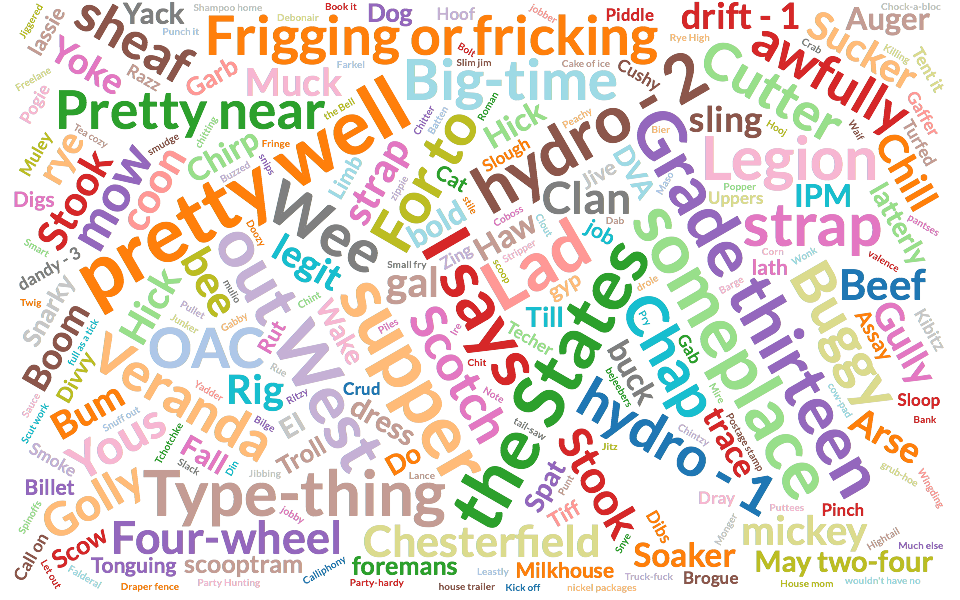
Word cloud of terms collected thus far: http://ontariodialects.chass.utoronto.ca/cloud


